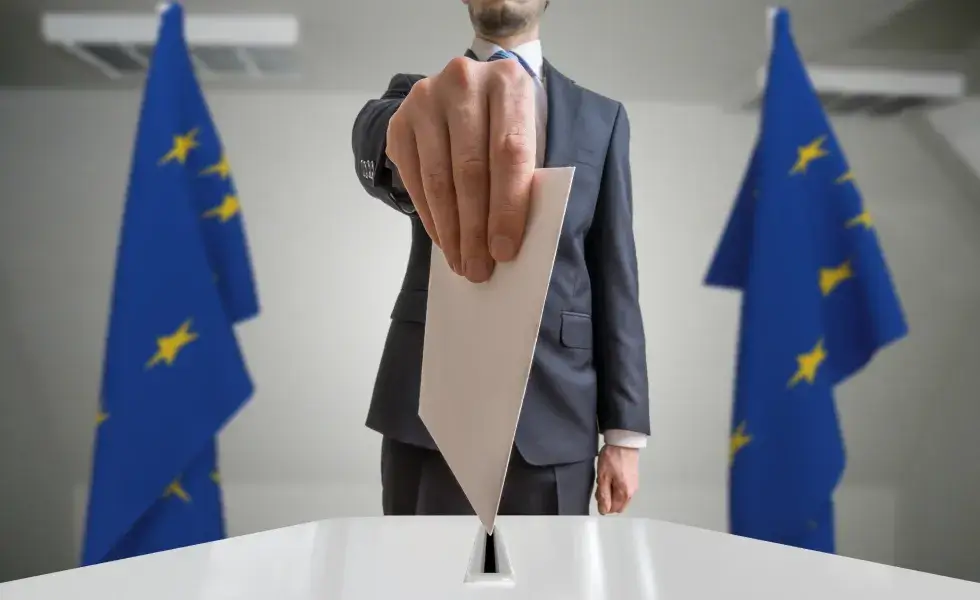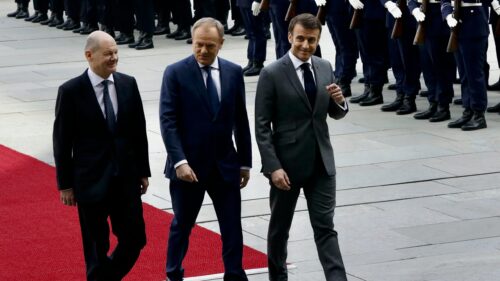Elections for the European Parliament are currently underway. 360 million people are eligible to vote for 720 members of the EU’s legislative body from June 6 to 9. In the five years since the last elections, European Institutions have faced interlocking crises like never before: the Covid-19 pandemic, the challenge of joint vaccine procurement, the Russian invasion of Ukraine, the politics of sanctions in response, the energy crisis, the war in Gaza.
A completely new political balance is at stake in the Old Continent. Paradoxically, the voter turnout is expected to rise even while the support of towards anti-EU parties is increasing.
The more Europeans love Europe, the more they hate it.
The more active the European Union is in managing crises, the more its bureaucracy, flaws and difficulties become visible to the public. This has become fertile ground for right-wing parties demanding a return to national sovereignty. Meanwhile, the political center is shrinking.
A recent Bertelsmann Stiftung study indicates that 60% of Europeans intend to vote. Despite an East–West disparity — only 29% of the population of the Czech Republic voted in 2019 — the trend is generally positive, especially among young Europeans.
According to a recent TUI Siftung survey, 58% of 16- to 20-year-olds consider European elections “important.” The most convinced are young Germans (67%), while the French are the least (50%). Nearly two thirds of Greek youth say that European elections are far more important than national ones. Between 50% and 70% see themselves as “European” and not only as citizens of their member states.
Under-30s could pull turnouts up. According to a survey from Eurobarometer, 64% of young voters intend to vote. The most enthusiastic are Romanians (78%) and Portuguese (77%).
Despite the EU’s appeal to the youth, right-wing and populist parties are gaining momentum. These parties generally ask for “less Europe.” They’re no longer asking for a Brexit-like solution; they want simply more sovereignty. They don’t want a bigger European budget, or a common European foreign or defence policy. They prize their individual veto, as Hungary has been showing by impeding several rounds of EU military funding for Ukraine. What these “Eurosceptics” have in mind is just Europe à la carte — the union is good and useful when it provides money and alliances, and bad when it asks for something in return.
Two hard-right parties stand to be the biggest beneficiaries this year. French politician Marine Le Pen’s Rassemblement National, which is part of the European parliamentary group Identity and Democracy (ID), and Italian Prime Minister Giorgia Meloni’s Fratelli d’Italia, which is part of the European Conservatives and Reformists group.
Germany’s extreme-right Alternative für Deutschland, however, has flagged in recent polls. The party used to belong to ID but was kicked out after corruption scandals involving Russia and China and after the recent extreme right declarations of spitzenkandidat Maximilian Krah, who told La Repubblica that one shouldn’t “generalize” all SS officers as criminals.
In Belgium, where federal and European elections are both taking place June 9, another ID party, the Flemish nationalist Vlaams Belang (VB), is at 27% in the polls and has a good chance in the federal elections. Across the border in the Netherlands, Geert Wilders’s Party for Freedom, has already been part of the ruling coalition in Amsterdam for a few weeks, dominates the polls. Last but not least we have the Austrian Freiheitliche Partei Österreich, another ID party, which was part of the first Sebastian Kurz cabinet in Vienna from 2017 to 2019. This nationalist and extreme-right party is now getting great hype, leading the polls with 29%.
The center will not hold
While the far right is moving forward in Europe, center-right and center-left parties are extremizing their own positions. In Germany, this phenomenon is called Polarisierung. Two good examples of this are the center-right Christian Democrats (CDU) in Germany and the center-left Democratic Party (PD) in Italy.
The CDU, with its leader Friederich Merz, turned rightwards after Chancellor Angela Merkel’s tenure ended in 2021. The party’s manifesto now claims that Islam only belongs to Germany if Muslims “share our values.” The CDU favors of stricter migrant policy. Merkel’s 2015 slogan about migration, “We can do it!” is now a bad memory. The CDU is now calling for asylum applicants to be processed outside the EU in a “safe third country,” after the Rwanda model proposed by British Prime Minister Rishi Sunak.
A similar but opposite process is ongoing with the PD under the leadership of Elly Schlein. She is leading the party on a far leftist path compared to five years ago. The “new” PD promises social policies like minimum wage, the maintenance of the public health system against privatization and equal rights for all.
The parties may be doing so in order to counteract the appeal of the radical right. Whether this strategy will be successful remains to be seen.
Europe stands at a crossroads. The current elections will determine whether the European Union remains a political force or becomes a mere region on the map.
[Anton Schauble edited this piece.]
The views expressed in this article are the author’s own and do not necessarily reflect Fair Observer’s editorial policy.
Support Fair Observer
We rely on your support for our independence, diversity and quality.
For more than 10 years, Fair Observer has been free, fair and independent. No billionaire owns us, no advertisers control us. We are a reader-supported nonprofit. Unlike many other publications, we keep our content free for readers regardless of where they live or whether they can afford to pay. We have no paywalls and no ads.
In the post-truth era of fake news, echo chambers and filter bubbles, we publish a plurality of perspectives from around the world. Anyone can publish with us, but everyone goes through a rigorous editorial process. So, you get fact-checked, well-reasoned content instead of noise.
We publish 2,500+ voices from 90+ countries. We also conduct education and training programs
on subjects ranging from digital media and journalism to writing and critical thinking. This
doesn’t come cheap. Servers, editors, trainers and web developers cost
money.
Please consider supporting us on a regular basis as a recurring donor or a
sustaining member.
Will you support FO’s journalism?
We rely on your support for our independence, diversity and quality.










Comment